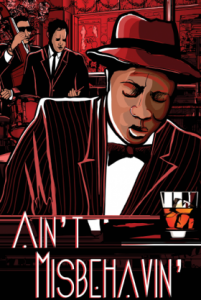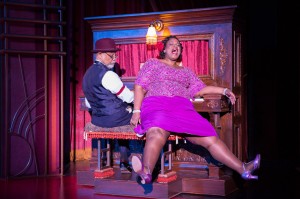Filichia Features: Should You Do Some Misbehavin'?
Filichia Features: Should You Do Some Misbehavin'?
 How about doing Ain't Misbehavin' as a midnight show?
How about doing Ain't Misbehavin' as a midnight show?
Of course there’s nothing wrong with presenting the Tony-winning smash hit at your usual 8 p.m. start or by having matinees at 2 or 3 p.m. Thousands have done so and have seen felicitous results.
But while I was watching original director Richard Maltby, Jr.’s sharp new production at the Delaware Theatre Company, I was reminded that the songs which Fats Waller (1904-1943) wrote or recorded are often ribald. They employ more double entendres than ANNIE has orphans.
Now I’m not saying that the show should be X-rated. Far from it. The three women or two men ain’t even ostensibly misbehavin’. While there are as many sex songs as love songs, they’re accompanied by little more than an occasional affectionate poke in the ribs or some smile-inducing huggin’.
Still, many songs imply that hedonism is on this cast’s minds – or at least has been. The way that Debra Walton sings “Keepin’ out of Mischief Now” shows that her character has now fallen in genuine love to the point where she’ll now walk the straight and narrow. But she doesn’t neglect to let us know she’s already been around the block several times.
Apparently “Fats” (real name: Thomas) had not only a lusty appetite for food, but also an equally voracious one for matters of the flesh. True, he can’t be named the most responsible for any naughtiness, for he didn’t write the words but “only” composed the music. Nevertheless, there’s no mistaking that he was attracted to sexy subject matter.
While one song is matter-of-factly titled “Find out What They Like,” the line that follows is “and how they like it, and let ‘em have it just that way.” Believe me, when Cynthia Thomas and Kecia Lewis sing it, they aren’t urging women to get store-bought gifts as presents for their men. “Get some cash for your trash” may seem to be a public service announcement, but here Kecia and Doug Eskew manage to make it sound sexual. “I’m Gonna Sit Right down and Write Myself a Letter” has a lyric that the singer will put “a lot of kisses on the bottom” – meaning at the end of the letter -- but here Doug implies that he’ll bestow kisses on Kecia’s gluteus maximus.
Thus Maltby has his singers play into the benign bawdiness. Although one lyric goes “I don’t know my elbow from my ear,” here Kecia takes a few seconds’ pause between “my” and “ear” to make us believe that she had prepared to cite a different part of the body that’s located a couple of feet lower. And when Cynthia sings “Squeeze Me,” she takes no chances that anyone might miss the point; she invitingly flutters her eyelashes with the speed of an in-heat hummingbird that’s beating its wings.
 William Foster McDaniel and Kecia Lewis. Photo by Matt Urban / Mobius New Media, Inc.
William Foster McDaniel and Kecia Lewis. Photo by Matt Urban / Mobius New Media, Inc.
Although every dramatic work is supposed to have conflict, revues are usually excused from this demand. And yet, Ain't Misbehavin' does have some friction as each woman makes no bones about being in competition with the others both for stage time and the men. There is one fewer man, after all, and, to cite a 1969 film, “Three into Two Won’t Go” (well, not if they ain’t misbehavin’). Whenever Kecia or Cynthia finds that Doug or Eugene Fleming is interested in Debra, she doesn’t go to pieces, feel inferior or blame herself. She instead castigates him for not treating her in the way that she rightly deserves.
On the other hand, all the women aren’t above looking into the audience, catching the eye of an audience member and overtly flirting before snarling such sentiments as “Eat your heart out!”
The biggest conflict comes at the end of the first act as the company sings “The Joint Is Jumpin’.” Actually, “jumpin’” is putting it mildly, for in the middle of a song, the men fight over (what else?) the women, which leads to Doug’s pulling out a gun and firing it.
At least he points it to the ceiling, and none of the others is hurt. Perhaps no one in your audience will be startled, for you’ll probably have the now-ubiquitous sign in your lobby alerting people that “a gunshot will be fired during this performance” (a sign that, when you think of it, always ruins the suspense of a show).
Underneath the gunshot warning you may well also warn that “Cigarettes will be smoked during this performance.” Many will wish that what Eugene is said to be smoking is a mere cigarette, but “The Viper’s Drag” concerns a very different substance. Be aware of this before planning a production; one never knows, do one, if some in your community might object.
 Eugene Fleming, Cynthia Thomas, Kecia Lewis, Debra Walton, Doug Eskew. Photo by Matt Urban / Mobius New Media, Inc.
Eugene Fleming, Cynthia Thomas, Kecia Lewis, Debra Walton, Doug Eskew. Photo by Matt Urban / Mobius New Media, Inc.
However, you might get away with it if you treat the song in the wise way that Maltby does. He’s instructed Eugene to blow some fancy smoke rings; Fleming does it with such aplomb that the audience finds itself distracted by the smoke-show.
Say what you will, the sequence is historically accurate. Long before the era of “sex and drugs and rock and roll,” Waller lived in a world of sex and drugs and jazz. Granted, “The Viper’s Drag” is the only song that alludes to drug use. But be apprised that it’s there.
Have we mentioned that the show celebrates African-Americans and is performed by them? That leads to “Black and Blue,” the show’s penultimate sequence. It’s a serious moment in which the five sing lyricist Andy Razaf’s rueful observations: “What did I do to be so black -- and blue? … I can't hide what is on my face … I'm so forlorn … My heart is torn; why was I born?” Even the hardest of hearts would have to soften after hearing this song.
Because the show ostensibly takes place in a Harlem nightclub, you won’t need much of a set. A false proscenium arch with a ribbon of tiny lights placed around it will swing it. Put your six-piece band behind it, and you’re all (pardon the pun) set.
Those who play in large orchestras for large musicals wind up being anonymous in that pit below the stage. But musicians in small bands in musicals as small as Ain't Misbehavin' don’t suffer that fate. During the entr’acte, which follows an act in which each musician has proved himself worthy, the trombonist, trumpeter and saxophonist each gets a moment to stand and play (the bass player, of course, has been standing all along); a nice round of applause awaits each. Of course, the drummer remains seated while making the drums go bang and the cymbals clang, but he gets a solo and just as much applause as the others.
What else? Find yourself an expert spotlight operator. Here in Delaware, Cindy Adams gets program credit and deserves it for aptly illuminating each and every performer at the right place at the right time and holding steady. Compare this to a musical I saw recently where the person on the follow spot jiggled it so much that I thought, “Lucky for us that he doesn’t work with plutonium. We’d all be blown to kingdom come.”
When Clive Barnes reviewed A LITTLE NIGHT MUSIC for The New York Times in 1973, he exclaimed “Good God! An adult musical!” Here’s betting that when Ain't Misbehavin' opened, he wished he’s saved the line for this hit.
 Check out Peter’s weekly column each Tuesday at www.masterworksbroadway.com and each Friday at www.kritzerland.com. Peter’s newest book, Strippers, Showgirls, and Sharks: A Very Opinionated History of the Broadway Musicals That Did Not Win the Tony Award is available NOW.
Check out Peter’s weekly column each Tuesday at www.masterworksbroadway.com and each Friday at www.kritzerland.com. Peter’s newest book, Strippers, Showgirls, and Sharks: A Very Opinionated History of the Broadway Musicals That Did Not Win the Tony Award is available NOW.

























